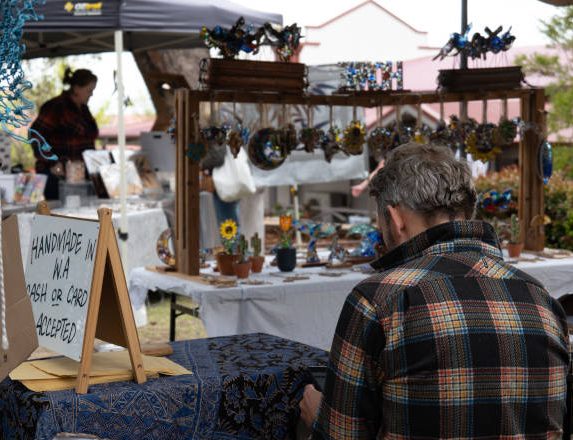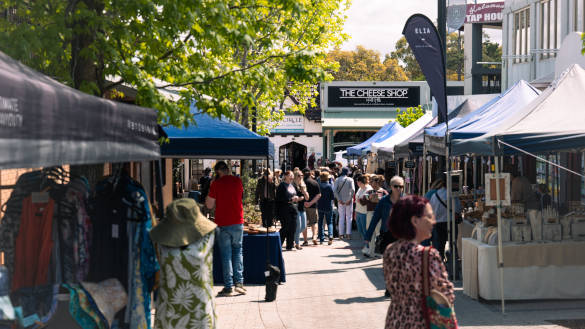For most grey nomads, visiting markets as they travel offers a chance to get a real flavour of a new area, to see what local artisans have been producing, and to perhaps pick up a unique memento … but all is not always what it seems.
There has been an uptick in recent years of stallholders selling wares billed as locally made that have actually been bought online from overseas.
Jo Harvey, who manages Sydney’s Kirribilli markets, told the GNT she has actually seen people putting handmade labels on items that were clearly bulk purchased elsewhere.
“We don’t want to see mass-produced things in artisans’ markets and see all markets become the same,” she said.

Many markets pride themselves on their handmade goods PIC: Kalamunda Artisan Market
“People – especially grey nomads visiting new areas – want to go to markets and see local goods and unique ideas and local talent … that’s what makes going to different markets so interesting and exciting.”
The Kirribilli markets, like many others, has acted to protect its integrity. Anyone seeking to have a stall in the artisans’ section has to apply online, and must state products are handmade, and say where the materials were sourced from.
It’s a similar story at Darwin’s Mindil Beach Sunset Market. “We have a policy which strongly favours locally sourced and produced goods and most of our art and craft stalls are genuinely making and selling their own works,” said the Market’s General Manager, Ilana Eldridge. “I can absolutely vouch for the local authenticity of more than 90% of the products sold there … as for the rest, well, what can I say?”

The Kalamunda Artisan Market is popular with grey nomads. PIC: Kalamunda Artisan Market
Ms Eldridge says grey nomads shouldn’t be afraid to ask questions of the stallholders. “Most are very forthcoming about their wares and, if they’re not, then trust your instincts,” she said. “Stallholders behaving unscrupulously don’t last long at Mindil!”
Ms Edridge says grey nomads are an incredibly important to the Mindil Beach Sunset Markets.
“While everyone is welcome at Mindil, we particularly enjoy the interaction with mature people who are generally, thoughtful, take the time to look closely and ask questions, often provide useful feedback and, dare I say it, are often buying gifts for family and friends,” she said. “Keep coming, you’re always welcome!”
Over in WA, the Kalamunda Artisan Market, which is run by Kalamunda Rotary, has been operating in the Perth Hills for more than a quarter of a century.
“We were one of the first craft markets in Perth started before imports started flooding in,” said Market Manager, Sheryl Jury. “At our market, we have a criteria for stallholders wishing to apply that requires that they make their product themselves or significantly add to it.”
She says that stallholders must have their application accepted before they can come along …. something that many of the better markets now do.
Ms Jury says they Kalamunda considers anything made in WA to be local.
“Some of stallholders travel from Margaret River and other country towns to attend our market, primarily because it is a handmade market,” she said. “There is something for everyone and it’s a great day out.”
She says that markets that have imports probably do not have many local and handmade goods because they cannot compete on price.
 “Some of our stallholders have been with us for 20 odd years we value the contribution they have made to our market over the years,” said Ms Jury. “Allowing products that are made overseas would undermine this relationship and they would not be able to compete … there is a market for people wanting to purchase cheaper products at markets, just not at our market!”
“Some of our stallholders have been with us for 20 odd years we value the contribution they have made to our market over the years,” said Ms Jury. “Allowing products that are made overseas would undermine this relationship and they would not be able to compete … there is a market for people wanting to purchase cheaper products at markets, just not at our market!”
Fleur Adams, who is in charge of Perth Hills Events which organises several artisan markets in the area, says weeding out imports is an ongoing task.
“Unfortunately, we’ve had a few cases where applications listed products as handmade, but on event day what turned up was clearly mass-produced,” she said. “It does leave us with a bit of a sour taste.”
Ms Adams says, for example, she currently has a market stallholder application pending that, after a quick Google search, appears to be mass-produced.
“While we have no issue with these products at our standard markets, at our artisan events we strongly discourage them in order to protect the integrity of our handmade focus,” she said. “We also ask that vendors keep an eye out and let us know if they spot stalls that don’t align with this.”
Ms Adams says some key things to look out for when spotting if something is genuinely handmade are:
# How enjoyable do you find visiting markets when you are in a new area, and how important is it to you that you are browsing genuine locally made products, rather than mass produced imports? Email us here to share your thoughts.
Are you a Grey Nomad member yet? Click here to find out about the discounts, competitions and other benefits on offer.